Artificial Intelligence (AI) is changing the world and even big companies like Microsoft and Tesla is entering the space. ChatGPT has revolutionized how we ask questions and Elon Musk predicts that AI will change other industries too. Is influencer marketing safe? We don’t think so.
In this article, we’ll talk about the role of AI in influencer marketing and how it is upgrading the landscape.
Where AI Stands Today
Artificial Intelligence is no more a dream, it’s a reality. Tools like Dall-E, Lensa, and ChatGPT are already popular. In fact, AI has made significant strides in influencer marketing over the past few years and is already an integral part of many influencer marketing campaigns.
Want To Simplify Your Influencer Marketing Campaign?
Afluencer makes everything simple for you. From signing up to customizing your profile to making valuable connections.
LET’S SIMPLIFY THINGS
The AI influencer marketing space is fast growing and was said to be worth USD 2.4 billion in 2021. It is estimated to hit the $3.9 billion mark by 2026, growing at a rate of 10%. More and more influencers and brands are looking at utilizing AI tools. A Rakuten Advertising report highlights how 62% of marketers plan to use AI-powered influencer marketing tools this year.
How Artificial Intelligence Can Help Brands
To answer this question, we will have to understand the influencer marketing challenges brands face as the main job of AI is to solve these challenges.
AI Can Help Identify Fake Influencers
Social media is full of fake influencers with bought followers. Unfortunately, it is common for influencers to buy fake followers to boost their numbers and attract more brands. In fact, big names like Kim Kardashian and Priyanka Chopra are known to have fake followers. Hence, it doesn’t come as a surprise that over 65% of brands have faced ‘influencer fraud’.
Brands do not like fake followers as they do not truly represent the reach or influence an influencer has. However, verifying authenticity can be a little hard as they have to look at a number of parameters, such as engagement rate, to determine whether or not an influencer has fake followers.
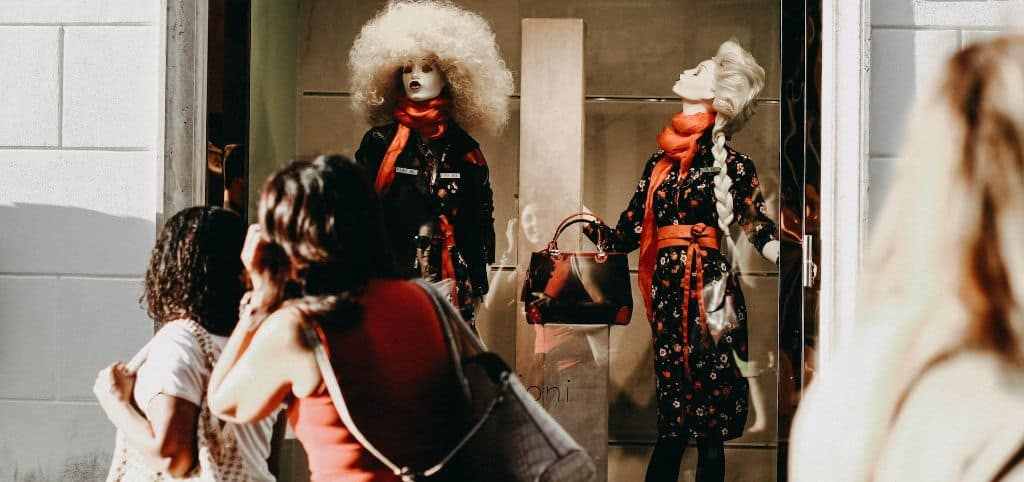
AI can perform this job faster and in a more reliable manner. Here’s how:
⇨ Audience Analysis
AI can analyze an influencer’s followers to identify fake accounts. For example, AI can look for patterns in follower demographics, such as large numbers of followers from a single country or age group, or followers with no profile pictures or bios. Doing this manually can take hours. AI can create a report in a few minutes.
⇨ Engagement Analysis
AI can analyze an influencer’s engagement metrics, such as likes, comments, and shares, to identify anomalies. For example, if an influencer has a large number of followers but very few likes or comments on their posts, this could be a sign of fake followers. At Afluencer, we use the latest technologies to provide reliable engagement analysis. You can have a look at the engagement rate to determine reliability. The average rate depends on several factors, including the niche. Nonetheless, anything above 10% is considered extraordinary and anything below 2% is considered bad and a red flag.
⇨ Content Analysis
AI can analyze an influencer’s content to identify fake or suspicious activity. For example, AI can look for patterns in the content, such as repeated use of the same hashtags or captions, or posts that are similar in style or composition. This isn’t linked to fake followers, however, content analysis shows how reliable and passionate an influencer is. Someone who rehashes the same content, again and again, may not go all out to create something unique for you.
⇨ Network Analysis
AI can analyze an influencer’s network to identify suspicious relationships. AI is already being used for this purpose around the world. We expect more influencer marketing platforms to incorporate these tools and make it easier for brands to identify fake followers.
Can Be a Great Way to Calculate Expected Results
Brands are often not sure about influencer marketing due to a lack of clarity. They do not know the expected outcome, hence they’re hesitant and not sure of how much money to spend on a campaign. AI can solve this problem by calculating the expected ROI and helping brands determine the right amount to spend on an influencer or campaign.
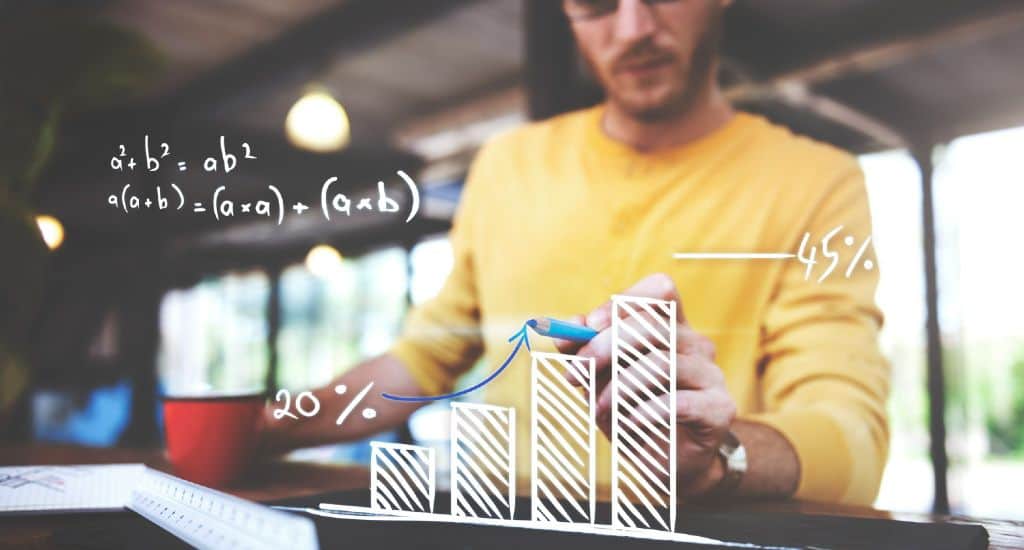
Here’s how:
⦾ Predictive Analytics
AI can use predictive analytics to analyze past influencer marketing campaigns and identify patterns that can be used to predict future results. For example, artificial intelligence tools can analyze data on the influencer’s audience, engagement rates, and conversion rates to predict how well a new campaign is likely to perform.
⦾ Attribution Modeling
AI can use attribution modeling to measure the impact of influencer marketing on various metrics such as website traffic, conversions, and sales. Attribution modeling involves analyzing multiple touchpoints along the customer journey to determine which touchpoints were most influential in driving a particular outcome.
⦾ Sentiment Analysis
AI can use sentiment analysis to measure the sentiment of social media posts and other content related to the influencer marketing campaign. Sentiment analysis involves analyzing text data to determine the overall sentiment, whether positive, negative, or neutral. This is important because influence is not always positive and some influencers with a huge number of followers (even if real) may not be beneficial for your business.
⦾ Performance Monitoring
AI can monitor the performance of influencer marketing campaigns in real-time and provide insights into which campaigns are performing well and which ones need improvement. This can help brands make data-driven decisions to optimize their influencer marketing campaigns.
This is one of the major benefits of AI in influencer marketing as brands have to spend a lot on predictive analysis and attribution modeling. With AI, they can bring the cost down and save money.
They can know exactly how many more followers or buyers a specific influencer or campaign can help them get. It’s the same as Pay Per Click (PPC) ads where you see the expected number of audience that’ll see your product or click on the ad. AI is not currently very commonly being used for this purpose in influencer marketing but we expect it to get incorporated in the future.
Know How Much to Pay to an Influencer
This point is linked to the previous two. AI can tell brands how useful an influencer is and help determine the ROI, which can be used to find out the right amount for a campaign. Since influencer marketing is in its infancy, prices are not fixed and most influencers are willing to negotiate. However, brands don’t always know the right price and often end up paying too much or offering too little, thus losing out on a good influencer.
Technically speaking, AI cannot tell how much to offer a candidate but it can highlight factors one should consider when determining the package. These include industry standards, content quality, expertise, and engagement among others.

Ultimately, the amount you pay an influencer will depend on a variety of factors, and it’s important to consider these carefully when negotiating rates. AI can help provide some guidance, but it’s always a good idea to consult with a human expert in the field to get the most accurate and up-to-date information. Furthermore, it’s believed that we’ll soon have AI tools that’ll have the ability to negotiate on your behalf.
Create Compelling Contracts
Since influencer marketing is still considered a new concept, not everyone does it formally. In fact, at times, contracts are missing and the agreement is based on messages exchanged through DMs. Only big companies or brands that are spending a lot hire the services of an attorney to draw up contracts. Small businesses usually avoid written agreements as they require a lot of time and money. However, things are now changing thanks to AI tools such as ChatGPT. They can create detailed agreements in a few seconds.
Here’s how AI can be used to create effective influencer marketing contracts:
1. Identifying Key Terms
AI can analyze large volumes of text and identify key terms and phrases that are commonly used in influencer marketing contracts. This can include things like payment terms, deliverables, deadlines, and non-disclosure agreements. The latest tools have passed law exams and are well aware of local and international laws and can create contracts that are ‘acceptable’ and ‘complete’.
2. Customizing Contracts
AI can use data about the influencer, the brand, and the campaign to customize contracts that are tailored to the specific needs of each party. This can include things like the scope of work, the duration of the campaign, and the types of content that the influencer will be creating. However, tools today are not designed to create contracts specific to this niche, hence someone who understands not just the influencer marketing industry but also law and AI may be needed for the job.
Though effective, AI alone (yet) may not be enough for this job and human input may be mandatory. Artificial intelligence tools can create agreements but someone will need to input details and terms that are related to the agreement. The biggest benefit is that you can get a reliable contract without having to hire the services of a professional. Nonetheless, an expert may be needed to review the agreement and ensure it meets all the legal requirements.
Can Analyze Campaigns
Businesses often find it difficult to analyze campaigns and they’re typically too late to find the outcome as they have to wait on the influencer to send reports. We believe that AI can turn out to be a partner here as it can analyze the performance of influencer marketing campaigns and provide insights into what is working and what is not. This can help brands and influencers optimize their campaigns and improve their ROI.
With AI, you will know exactly how a campaign is doing. The latest AI tools can even present graphs and conclusions to help you compare different campaigns and find the most suitable one.
Make It Easy to Find Suitable Influencers
Technically speaking, AI is already being used for this purpose. Take Afluencers, for example. We have a system in place that recommends reliable influencers and allows brands to search for suitable options using filters and search tools that remove the need to go through dozens of options as you can get a list of exactly who you want.
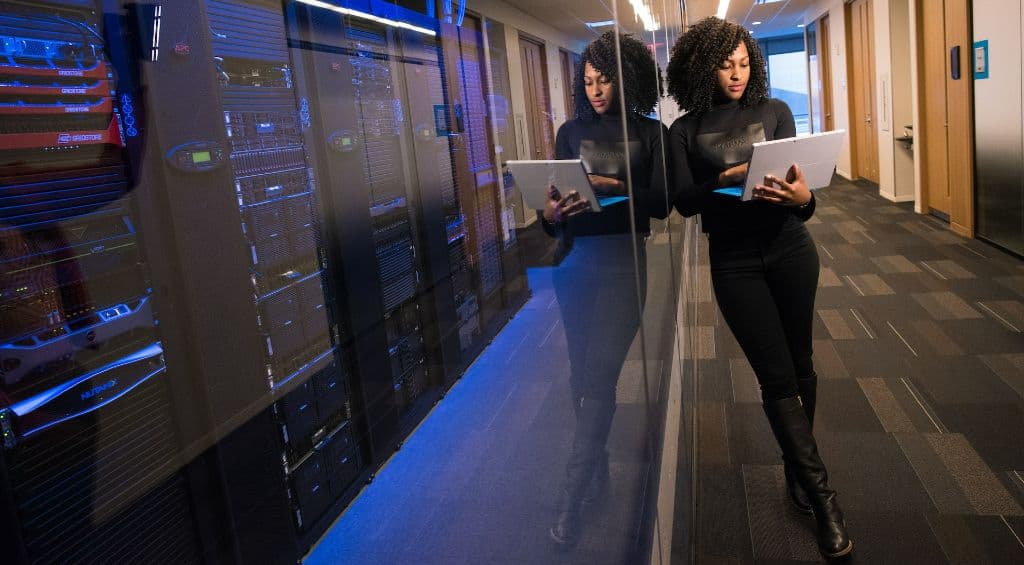
With AI fast improving, the system will get more efficient as well. You’ll not only be able to use the filter but also get recommendations based on your previous selections, competitors, and more. This can turn out to be a great time saver as AI tools can act as an assistant and perform simple tasks such as shortlisting candidates and approaching them with an offer. Moreover, some might even be able to negotiate on your behalf.
At the end of the day, you will be able to connect with influencers and strike a deal without doing any manual work.
How AI Can Help Influencers
Now, let’s talk about how artificial intelligence can benefit influencers. Again, we will look at the problems AI can solve for influencers.
Make it Easy to Create Pitches and Media Kits
Most influencers seem to hate the idea of writing pitches but at times it is mandatory as a pitch or proposal is needed to show why you are suitable for a job. We believe with AI, influencers will find it easier to create customized pitches. They can get a template and change it according to the job, thus saving time and getting a chance to reach a larger number of brands.
Similarly, they can use AI to create media kits, an important tool that tells brands who you are and why they need to hire you. A large number of platforms are now incorporating AI to create influencer profiles that serve as influencer media kits. In fact, at Afluencer, we use a similar technique and provide valuable information through profiles.
Brands can get data such as past collaborations, engagement rates, and demographic just by visiting influencer profiles. You can use this information as your media kit or use AI to generate customized kits.
Can Help Come Up With Creative Content
When we think of AI, we typically think of ChatGPT; however, AI includes several other tools, including some with the ability to create interesting graphics and video elements.
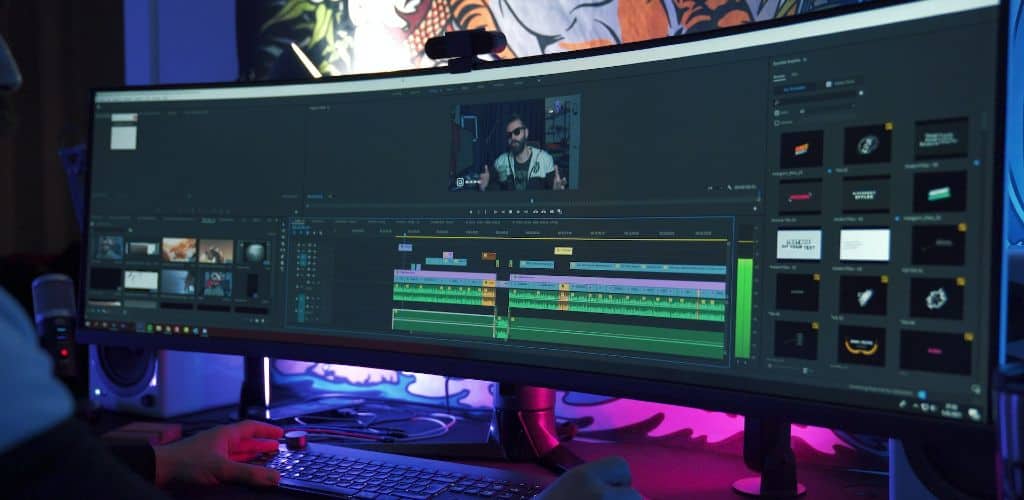
Here’s how AI can help influencers create graphics:
Find New Ideas
AI can be a great tool to come up with new ideas. After all, it is natural for people to run out of ideas and look for inspiration. Instead of going through individual profiles and sitting in the dark brainstorming ideas, you can ask AI to do the job on your behalf and suggest new ways to present a specific product or service.
AI can scan the market in a few seconds and highlight the latest trends and tell you what works and what doesn’t.
Convert Text Into Infographics
We know that brands love infographics. They want the information to be summarized in a few words and infographics can be a great way to do that. However, creating infographics requires a lot of time and effort, and influencers often have to hire the services of a graphic designer for the job, which adds to the cost and delays the process. But, now with AI in place, you can get stunning infographics in only a few seconds.
All you have to do is input data or stats and AI will change it into an easy-to-comprehend image that can be shared with your audiences.
Get Different Images
They say AI is going to replace graphic designers. We already have tools like Canva and DALL·E 2 with great features. They can generate images from text and offer ready-to-use templates that influencers can use to create banners, ads, thumbnails, and more.
Gone are the days when influencers had to hire the services of a graphics designer to create YouTube thumbnails or banners advertising discount codes. They can go to a website like Canva and get what they need in only a few minutes.
In addition, they can even show their creativity by generating cool images, such as Trump riding a unicorn. With AI, the possibilities are endless and influencers can utilize it to show their talents to the world.
Generate Hashtags
We know how important hashtags are. Nearly 75% of social media users use hashtags as they are available on almost all major platforms, including Twitter, Facebook, Instagram, and YouTube. However, finding the right hashtag can be hard and influencers often have to hire the services of a marketing expert to get the job done. But now with AI, things are only gonna get easier.

You can use AI tools that can generate hashtags based on your topic, post, niche, social media platform, and target audience. In just a few seconds, you can have a bunch of happening hashtags to use. Plus, some AI tools can even suggest ‘branded’ hashtags for use to boost your views and help you find a strong foothold.
Get Interesting Captions
Captions are very important and a majority of people go through captions. This is why it’s vital that you spend a good amount of time coming up with captions that generate interest and curiosity. AI can do it for you. It can suggest captions in your required tone (funny, authoritative) and even provide stats and data to make it more authentic.
Get Subtitles
If you watch videos on YouTube and other video-sharing platforms, you will come across captions or subtitles. Back in the day, the uploader had to manually write subtitles, which took a huge chunk of time.
According to most experts, it takes 5-10 minutes to transcribe a 1-minute video. This means an hour video could take up to 10 hours. However, now with AI, you can get subtitles in only a few minutes. In fact, YouTube has a built-in tool that automatically generates subtitles without the need to upload written text. Moreover, those who do not like YouTube’s tool can try other platforms and get subtitles for free.
We must mention that subtitles are not only for deaf people. Reports suggest that about 80% of viewers who read subtitles are not deaf. Some read subtitles for a better understanding of the topic and some to learn a different language. This is why more and more influencers are now using subtitles in their videos as they can be made available in multiple languages.
On the plus side, you also don’t need to hire the services of a translator to convert text from one language into another as there are some incredible AI tools that can get the job done for you.
Make Editing Easier
Influencers have to edit everything from captions to photos to videos. All this can be time-consuming and while some hire the services of freelancers and agencies, most don’t have a helping hand. We believe AI will prove to be of great advantage as it can perform the following tasks:
- Tools like Grammarly can edit written content and identify grammar issues, including typos. Such tools can correct typos and even offer suggestions.
- Tools such as Filmora can edit video content and change color, reduce the length, etc. Video editing can take hours and with an AI-enabled tool, influencers can have content ready in only a few minutes.
- Again, AI tools can edit photos in minutes. Influencers can set their favorite filters and add logos and data in a few seconds.
A Great Way to Find Suitable Collabs
Influencers spend a lot of time looking for suitable Collabs. At Afluencer, we use ML and AI tools to recommend the latest and most suitable Collabs that are selected based on influencer profiles. Our system automatically scans through hundreds of available Collabs and recommends offers that you are more likely to apply for and get accepted at.
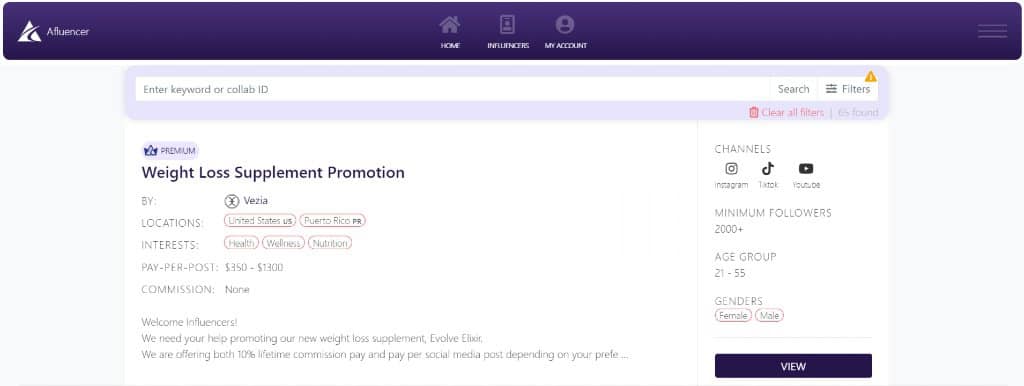
This removes the need to scan through dozens of available options and proves to be a great way to save time. We believe, in the future, the application process may become even more automated.
Makes It Easy to Analyze Audiences
Influencer marketing doesn’t only involve posting new content, it also includes understanding your audiences and going through existing content to comprehend what works and what doesn’t. AI can show your most popular posts, hashtags that help you reach the widest audiences, and more.
Will AI Remove the Need for Influencers?
The opinion seems to be mixed but most people agree that influencers will continue to exist; however, AI may make its mark and replace some influencers. If you search the web, you will find that virtual influencers such as Lil Miquela, Guggimon, and Knox Frost are already popular with thousands of followers.
Some people argue that these AI influencers were able to succeed because they offered something new to people and that most new AI influencers will find it difficult to make a mark. However, reports suggest that these top names enjoy the same degree of personal personalization as human influencers and have the ability to ‘influence’ people. Nonetheless, a large chunk of audiences does not like to follow AI influencers unless they offer something unique.
A major problem with AI influencers is a lack of trust. Audiences know that AI influencers are branded and not always honest. This is why we don’t see AI eradicating human influencers altogether. Influencers are valued for their ability to connect with their audiences on a personal level, share their experiences and opinions, and provide recommendations that their followers trust. This human connection is not something that can be easily replicated by AI.
In simple words, it is unlikely that AI will completely replace human influencers in the foreseeable future. Users connect with influencers because of their personalities, perspectives, and experiences. It would be difficult for AI to create content that captures the same level of authenticity and relatability.
To sum it up, AI influencers and human influencers will continue to coexist. We may say more AI influencers appear on the horizon with brands trying their luck in an attempt to save money and offer something new to audiences. But, human influencers are not going anywhere.
Are There Any Side Effects of Using AI for Influencer Marketing?
This article was mainly dedicated to the pros of AI and how it will change the influencer marketing industry. But, most experts agree that there are also some cons of AI, and not all changes will have a positive impact on the industry.
No Human Touch
One of the biggest problems with AI is a lack of a ‘human touch’. AI-generated content may be grammatically correct but it does not have human elements. AI cannot add emotions like humans can and influencer marketing is largely dependent on emotions, which makes AI less effective in some situations.
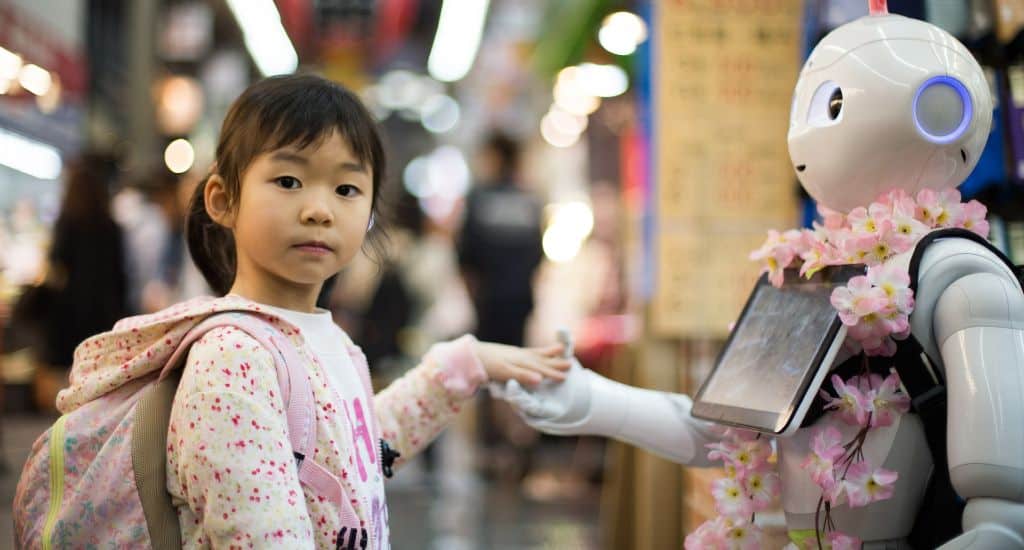
Influencers connect with audiences and form an emotional connection that AI may not be able to do. It cannot show empathy, sympathy, and other such feelings. Engineers are working on making changes to the technology but we are from a world where AI can be as good as humans when it comes to emotions.
Too Much Dependency on AI
It doesn’t take humans too long to get used to technology. Now that AI has become a part of our day-to-day lives, we may soon get used to it and stop being ‘creative’. This can result in redundancy and dependability, which may not be good for the industry. In addition, AI cannot fully operate on its own and you may still need someone to manage AI tools.
More Numbers to Deal With
Though not always a problem, having more data can make it harder to comprehend information. Plus, there’s additional pressure to ensure consumer data is not misused.
Potential Legal Issues
The use of AI comes with challenges, including legal compliance issues. A few weeks ago, an AI lawyer was in the news for being sued in the US due to practicing law without a valid license. Influencers don’t need a license but they can still get into trouble if the AI tool they use fails to provide correct tips and causes any sort of loss to the other party.
The same goes for brands. They cannot blindly trust AI as content produced by AI tools needs to be examined by experts to ensure it meets all legal requirements, is ethical, and is permissible.
Not Always Cheap
Brands typically use AI to save money but it isn’t always cheap. In fact, brands may need huge capital to invest in AI and come up with a customized tool according to their requirements. In addition, they may need to hire someone to manage the tool and ensure it works as expected.
Furthermore, there is also a time lag as AI has to be trained before it can be used. This can take weeks if not months. The software will not work properly if it hasn’t been fed the right and up-to-date information.
No Uniqueness
A major problem with AI is a lack of uniqueness. If two people use the same tool to perform the same task, they’d get identical results (in most cases), which means most influencers will start to lose their individual identity, which is important for them to succeed.
This will not only impact individual influencers but also the entire industry. Users follow influencers due to unique content. At the end of the day, it is about what someone brings to the table. Some influencers are popular for the unique hacks they offer and some for showing new experiences. With AI, things can get limited as AI can only provide information that has been fed into it, which may not always be relevant. Moreover, in some cases, it may provide dated information.
Information May Be Incorrect
Unfortunately, AI is not always correct, hence it may not be safe to rely entirely on it. If you search the web, you will find how AI has given incorrect answers or suggestions on a number of occasions. No business or influencer can afford to give the wrong suggestion to a follower as it could result in a backlash and a bad public image.
The problem with AI is that the information it provides is usually dated. The previous version of ChatGPT, for example, did not take the latest news into consideration and provided outdated suggestions. This can prove to be a huge problem for influencers as users follow influencers to find solutions to the latest problems and do not want incorrect or old information.
AI Is Not Welcomed
While some brands are okay with the idea of using artificial intelligence, some are against it. In fact, a large number of brands discourage working with influencers who use AI tools as they do not trust artificial intelligence. Things are gradually changing and more and more companies are now willing to use AI tools in some capacity but it will be a while before all brands welcome AI. Also, even then, some companies will prefer the traditional approach, which may make it harder for some influencers to succeed.
In addition to all these issues, it is also hard to quantify AI’s role in improving customer experience or brand awareness. However, despite all these challenges, we expect the role of AI in influencer marketing to continue to increase in the future.
Try These 7 AI Tools for Influencer Marketing
Ready to let AI change how you handle influencer marketing campaigns? Give these AI tools a try:
1. Afluencer – Engagement Rate Calculator
Afluencer offers an engagement rate calculator that uses AI to calculate engagement rates. Unlike some other similar options out there, our engagement rate calculator supports multiple platforms, including Instagram, TikTok, and YouTube. You can see existing and lifetime engagement rates, in addition to data like media count, average likes, and average comments.
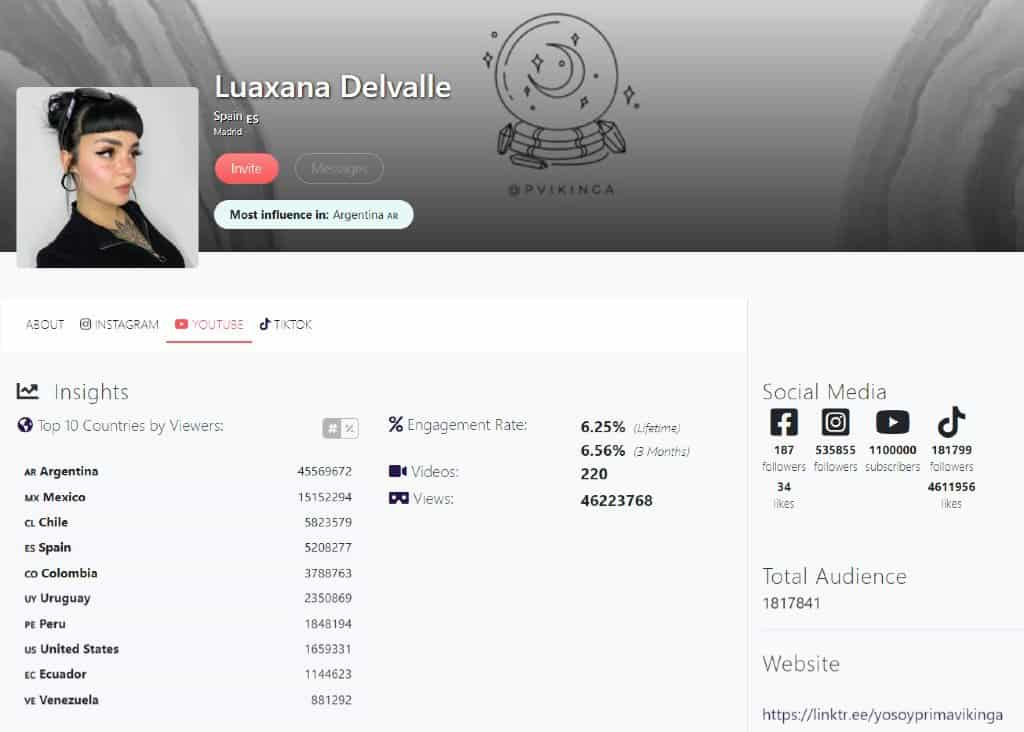
There are even charts to help you compare different options.
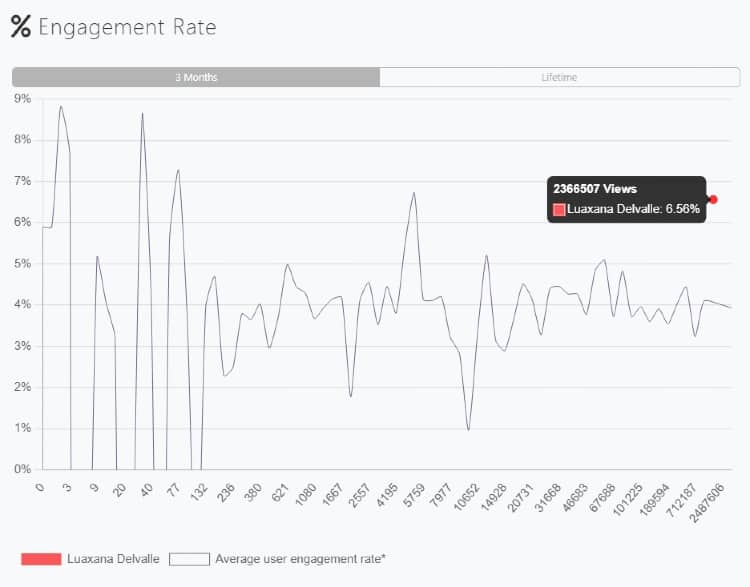
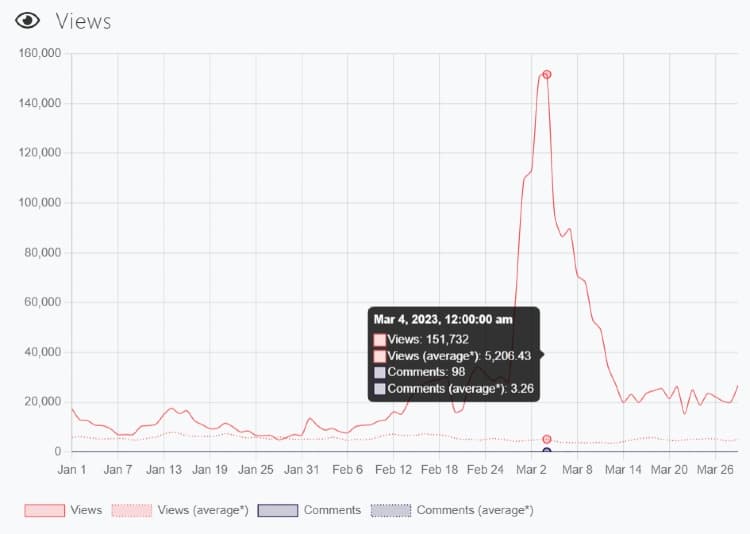
Our built-in tool is free to use and highly reliable. Brands can visit influencer profiles to get access to this information and influencers can sign up for a free account and link their social media handles to get the numbers.
Sign up and get access to valuable insights today.
2. Jasper.ai – Writing Assistant
Formerly known as Jarvis, Jasper AI is a popular content generator that helps create unique content in a few seconds. It can be used to generate emails, articles, social media content, and advertising copy. The tool supports more than 25 languages, including English, Spanish, and Japanese, and can even read content for you.
Said to be suitable for influencers, this AI tool can even create creative stories and is perfect for journalists as well. Some other great features of Jasper include:
- Content Improver works on existing content to make it more engaging.
- Engaging Questions gives you relevant and engaging questions to ask your audiences.
- Pattern Recognition apes your writing style and retains your personality.
The tool is fully trained and can be a great assistant. We believe it can be effective in keeping your personality alive while automating tasks. The best thing about the tool is its ability to find the latest information and not just replicate old data. It’s popular not only among influencers but also among big corporations like IBM and Google.
3. FaceApp – Beauty Tool
This might come as a surprise to some but FaceApp can be a great tool for influencers. This beauty app does a lot, including changing your gender, age, and hairstyle. Beauty influencers can try FaceApp to come up with new looks. However, we must add that not everyone supports FaceApp and other such apps as they can change your look and make others think that you’re fake. Still, a large number of influencers use AI beauty tools to boost their appearance.
Gone are the days of Photoshop as FaceApp and other such tools can get the job done in only a few minutes without you having to worry about going through long tutorials. Also, this tool isn’t only for beauty influencers but others can use it as well. You can come up with memes and skits through FaceApp and show your creativity to your followers.
The basic version of the app is free to use; however, you will have to buy a subscription if you wish to get access to all the features.
4. Grammarly – Grammar Assistant
Don’t want to use AI tools to create content from scratch? We suggest you still give AI a try and have Grammarly edit what you have. This incredible program can correct typos, syntax issues, and more. The premium version costs a little but the free version is decent as well.
5. ChatGPT – Virtual Assistant
No conversation about AI can be complete without a mention of ChatGPT, which is already used by millions and is one of the most reliable AI tools. ChatGPT can do everything from writing essays to suggesting solutions to problems to coming up with interesting captions.
6. Instagram Money Calculator – Incentive Calculator
Tools like Instagram Money Calculator can help you determine how much to pay for a campaign. We believe such apps can be beneficial for both brands and influencers as they can help influencers know their worth and tell brands what to offer when they approach an influencer.
These tools take into account factors such as the number of followers, engagement rate, etc. Plus, some can even scan previous Collabs and give you the expected ROI.
7. Canva – Image Editor
Known for being one of the best editing tools out there, Canva is a name that needs no introduction. It can do everything from creating banners to thumbnails to promos. The app comes with both paid and free features and is very easy to use.
AI In Influencer Marketing: Conclusion
Artificial Intelligence is the future and it’s slowly making its way into different industries. We are already seeing the impact of AI on influencer marketing. In fact, at Afluencer, we’re already using AI and will continue to do so to improve our services and better serve our users.